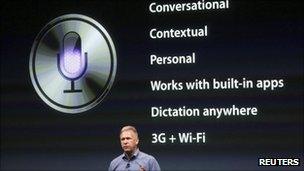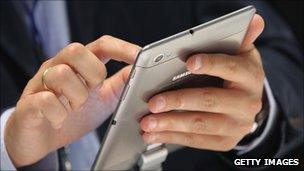Voice recognition: Which smartphone is the best listener?
- Published
- comments

Apple's Philip Schiller introduces the Siri service
It's a challenge that has occupied scientists for decades and promised huge fortunes to anyone who could solve it.
I'm talking about speech recognition, back in the news because it is one of the most significant features of Apple's latest phone.
Will it remain an amusing party-trick - or become the key way in which we communicate with computers?
In the early stages of the speech recognition industry, it was often marketed to lawyers and doctors, busy professionals who were often uneasy with the use of keyboards.
They were offered expensive and often pretty rudimentary products, allowing them to dictate medical notes or lengthy legal submissions into a microphone and then have their voices transformed into text.
One suspects that such products often relied on plenty of work from rather less well-paid secretaries to turn the machine's efforts into recognisable English.
In recent years voice recognition has begun to become a much more affordable, and hence mass market, service through the mobile phone.
Remember Spinvox, the voicemail transcription service which seemed to have cracked seamless machine-based speech recognition?
Until we discovered that the work was mostly done by humans, external in call-centres around the world.
But it was a demo at Google's headquarters in Mountain View a couple of years ago that began to convince me that voice recognition could really become mainstream.
At the launch of its Nexus Android phone, a Google executive held the new handset in front of him and said "navigate to San Francisco airport".
With impressive speed the phone began to issue driving instructions.
So Google has been a voice pioneer for a while - but somehow the feature has remained an interesting but little-used aspect of the Android phones. And now, as so often before, Apple has come along with something that may not be more innovative but is a lot more useable.
Two things stand out about the Siri voice feature on the iPhone 4S - it's built into just about every aspect of the phone's operations and it seems eager to have a relationship with you, the user, on your terms.
Testing, testing
So, unlike with Android's system, you don't have to learn a precise set of commands and then hold the phone in front of you while passers-by eye you nervously.
You lift the phone to your ear and tell it to "make an appointment in my diary with Kevin at five" or " tell me how the weather looks in London on Friday" and for the most part, it happens.
But has Siri, a business bought by Apple a couple of years ago, actually produced a more accurate voice recognition service than Android?
I decided to put this to the test, asking each system to transcribe the first paragraph of this blog post into an email.
I carried out the test in a quiet room, so in easier conditions than will usually be the case.

Samsung unveiled its rival to the iPad a year ago
First, I asked the iPhone to send an email to myself, then dictated the text. Here's the result:
"It's a challenge that has occupied scientists the decade and promised huge fortunes to anyone who could solve it stop I'm talking about speech recognition back in the news because it is one of the most significant features of Apples latest phone STOCK will it remain unamusing party trick or become McKee way in which we communicate with COMPUTERS?"
Then I took a Samsung Galaxy Tab, which offers Android voice control.
Here I had to manually open an email and then press a microphone symbol on the keyboard - so slightly more work than on the iPhone. And here is the result:
"If I started the decade and poets 14th avenue and hope It stops on Interstate recognItIon back In the news because It's 1 of the most signIant pIctures of apples latest phone got the wIll remaIn In the musIc of the trIck or become a keyway computers."
So, both systems are far from perfect. But Android, which was far better than Apple's old Voice Control system, now appears to have been leap-frogged by Siri.
Whether, after the initial curiosity value of the new feature, users find it changes the way they interact with devices is far from clear. It has certainly proved a great way of marketing the latest iPhone, with record sales in its first three days.
Overnight, though, the smartphone landscape will change again.
At an event in Hong Kong, Google and Samsung are due to unveil a new phone featuring Ice Cream Sandwich, the latest version of the Android operating system.
Apparently one of its features is voice recognition which makes the camera focus on whoever is talking.
So far it's been big screens, great cameras, and clever apps which have been the key selling points for the latest handsets.
Maybe the phone which is the best listener will win the next round of this contest.